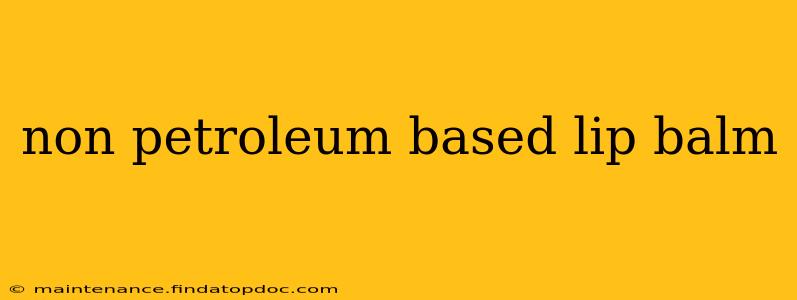Dry, chapped lips? Many reach for petroleum-based lip balms, but are there healthier alternatives? Absolutely! This guide dives deep into the world of non-petroleum-based lip balms, exploring their benefits, ingredients, and how to choose the best one for you. We'll also address some frequently asked questions to ensure you're fully informed about this growing segment of the lip care market.
What are the Benefits of Non-Petroleum Based Lip Balms?
Petroleum-based lip balms, while effective at creating a barrier, often contain mineral oil and petrolatum, which are byproducts of petroleum refining. While generally considered safe, some individuals prefer to avoid these ingredients due to environmental concerns or potential skin sensitivities. Non-petroleum alternatives offer several advantages:
- Natural Ingredients: Many non-petroleum lip balms boast natural ingredients like beeswax, shea butter, and various plant oils, offering nourishing and moisturizing properties. These ingredients often contain vitamins and antioxidants that benefit lip health.
- Environmentally Friendly: The production of non-petroleum lip balms often has a smaller environmental footprint compared to petroleum-based options. Look for brands committed to sustainable practices.
- Potentially Less Irritating: For those with sensitive skin or allergies, non-petroleum balms can be a gentler alternative, reducing the risk of irritation or allergic reactions.
- Hydration and Healing: Natural ingredients often provide deeper hydration and help repair chapped lips more effectively than simply creating a barrier.
What are the Common Ingredients in Non-Petroleum Based Lip Balms?
A wide variety of natural ingredients contribute to the effectiveness of non-petroleum lip balms. Here are some of the most common:
- Beeswax: Creates a protective barrier and adds texture.
- Shea Butter: Rich in vitamins and fatty acids, providing intense moisturization.
- Cocoa Butter: Similar to shea butter, offering deep hydration and a smooth texture.
- Coconut Oil: Known for its moisturizing and antibacterial properties.
- Olive Oil: Another excellent moisturizer with antioxidant benefits.
- Avocado Oil: Rich in vitamins A, D, and E, promoting lip health.
- Jojoba Oil: Closely resembles the skin's natural sebum, providing effective hydration without clogging pores.
Are Non-Petroleum Lip Balms Better Than Petroleum-Based Ones?
Whether a non-petroleum lip balm is "better" than a petroleum-based one depends on individual preferences and needs. Petroleum-based balms effectively create a protective barrier, but they lack the nourishing and healing properties often found in natural ingredients. Non-petroleum options offer these benefits, but might not provide the same level of immediate barrier protection. The best choice depends on your priorities and skin type.
What are the Best Non-Petroleum Lip Balms?
Choosing the "best" lip balm is subjective. Consider your preferences for scent, texture, and specific ingredients. Look for brands that clearly list their ingredients and prioritize natural, sustainably sourced materials. Many brands offer a variety of formulations catering to different needs, from intensely moisturizing to those with added sun protection.
How to Choose a Non-Petroleum Lip Balm?
When selecting a non-petroleum lip balm, consider the following:
- Ingredients: Prioritize natural, recognizable ingredients. Avoid artificial fragrances, colors, and preservatives whenever possible.
- Skin Sensitivity: If you have sensitive skin, choose balms with minimal ingredients and avoid potential irritants.
- Texture: Do you prefer a thick, creamy balm, or a lighter, more easily absorbed formula?
- Scent: Many natural balms offer subtle, natural scents, while others are unscented.
Can I Make My Own Non-Petroleum Lip Balm?
Yes! Making your own lip balm is a rewarding and surprisingly simple process. Numerous online resources provide detailed recipes and instructions, allowing you to customize your balm with your favorite ingredients and essential oils.
Do Non-Petroleum Lip Balms Expire?
Yes, even natural lip balms have a shelf life. Pay attention to the manufacturer's expiration date and discard any balm that shows signs of spoilage (e.g., rancid smell or unusual texture).
By understanding the benefits, ingredients, and selection criteria, you can confidently choose a non-petroleum-based lip balm that perfectly suits your needs and helps you achieve healthy, hydrated lips. Remember to always check the ingredient list to ensure it aligns with your preferences and any potential allergies.
